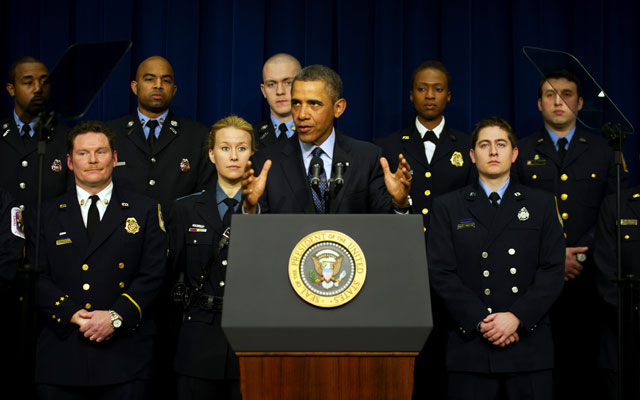With Growing National Security Threats, A New Counterterrorism Direction Is Needed
Steven Bucci /

JIM WATSON/AFP/Getty Images/Newscom
Later this week, President Obama will travel to the National Defense University (NDU) for a major policy address.
Under massive pressure to address his Administration’s mishandling of the terrorist murders of four Americans in Benghazi, Libya, and potentially illegal surveillance of Associated Press reporters, Obama will attempt to refocus the nation toward his polices for fighting what remains the most immediate threat to America: terrorism. This will include the use of drones, prisoners at Guantanamo Bay, and progress in the War on Terror in general.
It is not yet known what Obama will say. Will he retrench further on drone use against terrorists abroad? Will he move again to close Guantanamo? He will certainly not be able to claim that the “tide of war is receding,” as he once did.
This Administration has had some stunningly significant victories, most especially the killing of bin Laden. It has also had some terrible repudiations: disaster in Benghazi, the French intervention in Mali, a kidnapping in Algeria, Boko Haram in Nigeria, and homegrown bombers in Boston. The intent of the present policies may have been good, but the effects have been poor.
The over-reliance on drone strikes is a significant issue. The use of drones to kill leaders of the terrorist movement is laudable and a great tool, but it is wildly optimistic to think that alone, drone strikes would be enough to end al-Qaeda’s threat to Americans.
Even adding in the amazing capabilities of our high-end Special Operations Forces (SOF) is not sufficient. Al-Qaeda has metastasized from a centrally led organization to a nearly completely decentralized web that operates on the vaguest of “commander’s intent.” Groups in diverse areas attach themselves to al-Qaeda, and individuals self-radicalize in America and around the world. Instead of being beaten down, al-Qaeda grows every day.
Obama could also make a call to move counterterrorism back to the realm of law enforcement, where it resided during the Clinton Administration. This inadequate view led to the September 11 attacks in 2001. Such an effort would probably make many of the President’s supporters happy (the same ones who called Major Nidal Hassan’s terrorist attack on fellow Army service members an act of “work place violence”), but would be an unmitigated disaster. That would be exactly the wrong direction to go.
Likewise, a new effort to close Guantanamo would not be positive. Soon after his first election, Obama recognized that the Bush Administration had tried to “give back” nearly all the long-term detainees, but either could not find a country who would take them, or the detainee refused to be repatriated to their native lands because they did not want to face justice there (many countries’ prison systems are less hospitable then Guantanamo’s facilities).
Today this thorny problem still evades a solution that Congress can agree on. Obama’s desire for a public relations victory is not obtainable without the suspension of good judgment.
What does this all auger for the address at NDU? Clearly a new direction is required in the U.S. response to terrorism. The approach of the past five years has proven inadequate and been motivated more by wishful thinking than by harsh realities.
The terrorist threat to America and her allies is greater today, and more dangerous. Rather than back down and declare victory where none exists, the nation needs to push forward and aggressively hunt down its enemies.
Drones and SOF are not enough alone, trying to twist into a “legal pretzel” to close Guantanamo is a complete waste of effort, and wishing away the expanding threat of al-Qaeda’s affiliates is delusional. Yes, a new counterterrorism direction is needed, but it is more likely that this Administration does not have the stomach to provide the kind of aggressive strategy that is required.
